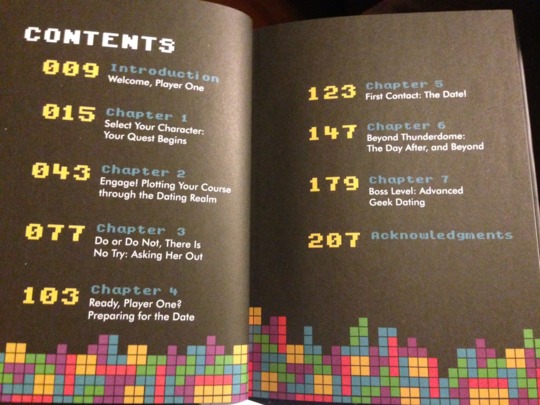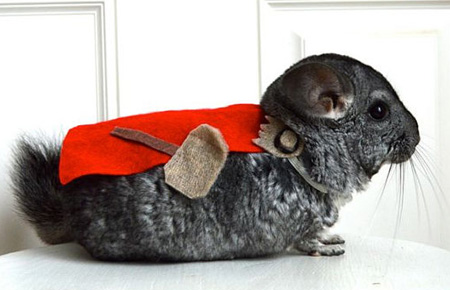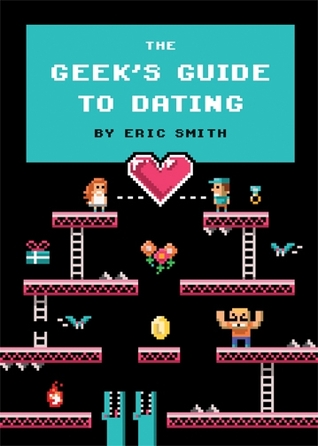There are plenty of criticisms that can be justly leveraged against dating / self-help books as a genre. And yet, people continue write them, because people continue to buy them, because people are always looking for that one little trick to success that no one else has ever figured out—except, of course, for this author of the book, who purports to believe that his/her generic-at-best or sociopathically-manipulative-at-worst book is, in fact, that end-all-be-all answer that everyone has been looking, and that only s/he is brilliant enough to have discovered.
So I guess what I’m trying to say is that, by comparison, The Geek’s Guide To Dating by Eric Smith is the worst dating/self-help book ever written because it is so genuinely delightful without being at all presumptuous. In fact, it’s so spot-on and utterly enjoyable that I think it should be up there with Dune, The Lord of the Rings, and The Hitchhiker’s Guide to the Galaxy as required reading for geekdom.
Please don’t take that to mean that I think this book is brilliant, revolutionary, and/or mindblowing-ly imaginative. It’s not. And of course it’s non-fiction, which already makes it a strange and unfair comparison to those aforementioned tomes. What I mean is that the realms of science fiction and fantasy have a philosophical history of humanism, of treating people justly and right, and of individuals rising up to challenge the perceived injustices of their kingdom/galaxy/whatever. And that right now, our often insular and esoteric culture of geekdom is so frequently plagued by cosplay creeps, disrespect, and bigotry. But The Geek’s Guide To Dating could actually offer some major steps in changing those troubling perspectives.
(Full disclosure: Eric Smith is the Social Media & Marketing Manager at Quirk Books, where I also blog from time to time)

Trust me when I say with absolutely no pride whatsoever that sad-and-lonely-and-completely-unaware-that-girls-might-actually-be-interested-in-him-19-year-old-Thom read a few similar “How To Pick Up Chicks” books in his time (Worldy-And-Much-More-Mature-28-Year-Old-Thom still asserts that The Game is a fascinating narrative, both because of and despite its horrifying misogyny and hypermasculinity). What separates The Geek’s Guide To Dating from other “Dating” books—aside from the adorable 8-bit renderings that illustrate its pages, or the wonderful way in which it’s structured like a video game guide, or the hilarious and idiosyncratic allusions to everything from classic Trek to Galaxy Quest to the original 31stcentury Guardians of the Galaxy—is that Smith at no point claims to know what women want or how they think, nor does he offer any suggestions for little tricks that “all” women go for. Instead, Smith presents a guide for putting your best geek forward, conveyed in a way that any self-proclaimed or incidental geek can understand. It’s all about showing you how you can still be yourself and use your own geeky quirks to your advantage, while also suggesting ways to pick up on your sweetie’s subtle (or not-so-subtle) social cues.
This is why I genuinely think this book is so important for right now. The information contained within the book is nothing new or revolutionary, but it’s presented in a way that is clear and enjoyable—and more importantly, in a way that can actually break through. Because unfortunately, there are still people who think it’s acceptable to make lewd comments to women at conventions, amongst the many other problems that plague the supposedly safe space of geek culture. And most attempts at addressing these kinds of situations only succeed in alienating the perpetrators—which is certainly better than allowing that behavior to continue unchecked, but doesn’t do much to change that person’s views. Because sometimes, cosplay creeps (and other fine purveyors of horribly inappropriate social interactions) are not malicious, and are genuinely unaware of just how awful their behavior is.
But in The Geek’s Guide To Dating, Eric Smith finds lots of fun and clever ways to address some typically problematic “geek” behaviors. For example, in Chapter 2 (“Engage!”), Smith offers some suggestions for alternative ways for geeks to start conversations with women, depending on the location that you meet. When you meet a girl in the Manga aisle at a comic book store, Smith rightfully asserts that “It’s cool that you’re so into shoujo manga. What would you say is the best series to start with?” is a better opening line than “You don’t seriously think that hearts-and-flowers crap is the same thing as a real graphic novel, do you?”. Similarly, Chapter 5 (“First Contact”) features a “First Date Simulator” with multiple choice answers to help guide the geek towards more appropriate conversations and answers. Some guys genuinely don’t see anything wrong with insulting a woman or questioning her geek credibility (pick-up culture refers to this method as “negging”), but Smith’s fun, video game guide-style anecdote might communicate the right ideas to these guys in a language they can understand. And even if it doesn’t help that many geeks find true love, maybe it will help make the video game store a much less uncomfortable environment for women.
The Geek’s Guide To Dating is certainly not trying to be subversive, or explicitly address these serious issues. Smith, like myself, is a heterosexual male, and while one would not be wrong to criticize the book for being heteronormative, I think this point overlooks the potential impact that the book can have on your average heterosexual male gamer / physicist / Trekkie / comic book fan / whatever. Diversity is important, and Smith is sure to include a “Note for the Gal Geek” in the beginning of book (which essentially says “This is a book written for straight geek guys by a straight geek guys only because it’s not fair for me to presume what women want or think, which is your first and most crucial lesson in how to meet women”), and peppers in acknowledgements throughout to non-heterosexual geeks. That’s because the orientation of the romantically-inclined geek who might be reading this doesn’t matter. Instead, the book focuses on the reader as potentially suitor—affectionately referred to as “Player One” throughout the text. Smith offers suggestions on how to find the right Player Two—whether or not s/he actually enjoys playing video games—and how to navigate that relationship in a successful team-up, to make that person the Spider-Man to your Ghost Rider (or what have you).
Social politics of geekdom aside, The Geek’s Guide to Dating is just plain fun. It’s an easy read that’s light-hearted and hilarious while still being full of insightful information on how to best present yourself and communicate with others (“You mean my girlfriend doesn’t want me to explain the entire Summers-Grey family tree to her in excruciating detail?”—me, every day of my relationship for the last four years). A book like this could easily pander to geek culture and infuriate elitists, but Eric Smith lets his geek badge shine—and it is very, very shiny indeed. He eschews personal narratives like his own epic Master Chief breakup in favor of references that run the gamut of geekdom from Final Fantasy to Flex Mentallo, and they’re always delightful and enlightening. And perhaps most importantly, he does not prescribe any hard rules for who or what is “geek.” This book is for anyone with a proud passion for video games, movies, science, books, or anything else you can think of, just so long as you’re looking to share that passion with that special someone else.

Since Eric opts to leave his own success story out of the book, I’ll share my own as proof of its effectiveness: I was reading The Geek’s Guide to Dating at a bar while waiting for my girlfriend to get out of rehearsal next door. The bartender sees what I’m reading and she says, “That looks fun. Do you need some advice, or do you know how to talk to women now? Let me know.” My beer was on the house, and her phone number was on the check, and my girlfriend laughed at me all the way home.
The Geek’s Guide to Dating is available December 3rd from Quirk Books
Thom Dunn is a Boston-based writer, musician, homebrewer, and new media artist. He enjoys Oxford commas, metaphysics, and romantic clichés (especially when they involve whiskey and robots). He once wooed a woman by writing the single greatest power-pop song about Spider-Man ever written; unfortunately, the same move didn’t work on Maurissa Tancheroen. Thom is a graduate of Clarion Writer’s Workshop at UCSD and he really, really, really hates the band Journey. Find out more at thomdunn.net.










